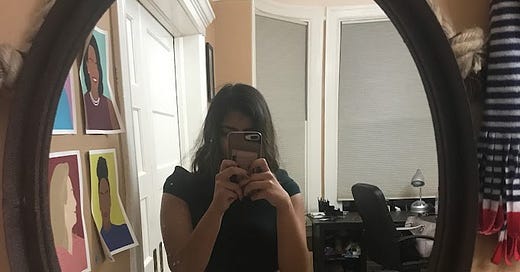Knowing yourself is how you build a great vision
Unlearning the need to rely on frameworks and craft to nurture my intuition
Great leaders must have a vision. But what does that mean?
As I transition to directing, I constantly struggle with this question. Perhaps it meant I needed to know exactly how the movie should look in my head and communicate that to my crew while leaving enough space for their unique contributions.
So, how do you do this?
Bringing it back.
I struggled with this same question in product.
My answer? Frameworks. It made intuitive sense. If I could “prove” that I was right using preexisting knowledge and structure, I would have a better chance of getting buy-in from my team and, therefore, executing on the vision.
But then, I became too obsessed with “getting the framework right,” sometimes focusing on details that don’t matter. Are we doing our segmentation right, or is this focused enough on our business goals? It also sometimes meant I would conflate vision and strategy together, spending too much time on the “how” and less of the “what.”
In the case of film, I did something similar by focusing on craft. I didn’t go to film school, and I constantly feel that I’m not good at my craft, which makes me think I don’t have vision. When I shared this with a mentor, he pushed my thinking by explaining that craft is ultimately a tool in service of the vision. Why am I choosing to focus on craft to explain my vision?
The truth? Because it sounds like what I’m supposed to do, which is another code word for me trying to prove myself. Instead of using this opportunity to showcase my story, I’m doing this to prove to others that I’m good enough—bringing the focus to me rather than the story.
Reframing visions
Through that conversation, I realized I need to reframe a vision into a point of view. By definition, it means people will inherently disagree with it—it’s a point of view, after all—but it requires putting an actual stake in the ground.
For a product vision, perhaps it’s your POV on how people use a particular technology. For film, it could be your POV on how a certain type of story is told.
One thing I like about this reframe is that it reduces pressure on the outcome. Many times, we see vision building as a test: are we smart and capable enough to do this thing? It turns the focus from the work onto our own insecurities, which makes it difficult to tap into our inner knowledge. We spend more time trying to do the vision thing right, which leads to harmful pressure that results in limiting beliefs (“I’m not good enough”) or poor collaboration (“I need to come up with the best ideas.”)
This is not to say that you shouldn’t use data or frameworks to inform your POV. Whether it’s user research for product vision or watching other films to hone your film’s vision, this type of work can help you sharpen your thinking.
At the same time, it’s also worth considering when it drowns out your voice and intuition. I’ve experienced this in product, where we use market analysis and trends as substitutes for our experience and understanding of the world. At the end of the day, a vision requires you to bring your voice into the space, which requires you to understand yourself. You won’t find this in any textbook or framework: it comes from regular reflection and spending time with yourself.
Turning inward to craft a vision.
As I craft a vision for my short film, I realize I don’t need to master technical craft to explain my story’s vision.
I need space to listen to my inner voice.
Doing so requires letting go of my insecurities about my capabilities as a director, which really requires accepting them.
Maybe I’m not a natural visual storyteller. Maybe I am indecisive. Maybe I’m not sure how to make these creative choices and have confidence.
Yet.
But I do know why I want to tell this story. I’ve spent four years writing it, first as a short story and then as a screenplay. While there’s still so much more to learn and explore, I have a foundation to build on.
But more than anything, this is an opportunity to let go of the need to constantly prove myself, and accept myself the way I am.
If you’d like to follow along on my journey to make my first film, “After Moonrise,” I’m sending monthly updates in a separate newsletter that provide a behind-the-scenes look at my progress, learnings, and next steps. To receive the updates, sign up for the newsletter here.Thanks for reading!
I’m on a journey to create a blended career across the creative arts, tech, and business. This newsletter is my way of sharing my reflections, thoughts, and advice. Here are some ways to support my work:
If you want more content like this, heart the post.
Share the post with a friend.
Hearing from readers also gives me a ton of energy. Drop a comment if you have any thoughts you’d like to share.
And if you haven’t subscribed already… consider joining the club? :) I post 2x a month on topics related to inner healing, reflections from my product career, building a creative career, and more!





Another good piece about your journey!
All roads travel to inside and this is where most of the solutions are found .
You are on right track
Good luck and lots of good wishes too